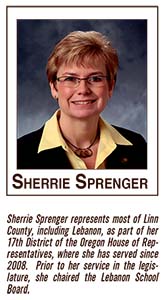Many of you have been contacting me with concerns regarding the super majority that exists here at the Capitol this session and the implications of that.
In order to explain a super majority and how it can impact the 2019 Session, let me first explain a simple majority. A simple majority exists when one party or another has 31 to 35 members out of the 60 representatives. Most of the years I have been in office, the legislature has had simple majorities.
So what is a super majority? A super majority exists whenever there are 36 members or more of one party. The number 36 is incredibly important because it takes 36 votes to pass a tax increase. This session, there are 38 Democrat members and 22 Republicans.
Most of you know I am not a big supporter of increased taxes at the state level because we cannot always track well where that money is going. I have heard from many that you would like to see curtailed spending at the state level.
As a contrast, the majority of the time when there are local bonds or operating levies, they are passed. This is true because local communities can see where these are necessary and when a bond is passed, it is required to be used for that specific purpose. We can see where our taxes are being put to use. Even my personal ballot reflects that I am for local levies.
That being said, not all Democrats are for tax increases. Not all Democrats vote the same, just like not all Republicans vote the same. However, a super majority allows the party with the majority to push its party’s agenda either to the right or to the left. Although not all Democrats align with the Portland liberal agenda, the party itself, due to the super majority, does not need all its members to support its agenda.
As I have mentioned before, 2011 was a unique year in that the number of Republicans and Democrats was evenly split at 30-30. It was a session of hard work, but good work in that the topics of discussion were issues that impacted the majority of Oregonians, not the majority party, because there was none.
When one party has 38 members, it skews the conversation topics in favor of the majority’s agenda. I have been present when the Democrats had a super majority in the past, but not when they had as many as they do this time around. This year, more than any other year, I feel the minority voice has been muted.
Because they have 38 members, it means they only need 36 of them to vote for their party’s tax agenda.





